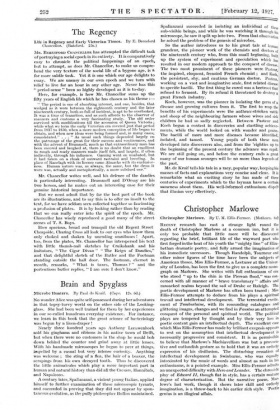Christopher Marlowe
Christopher Marlowe. By U. M. Ellis-Formor. (Methuen. Os.)
RECENT research has cast a strange light round the death of Christopher Marlowe at a common inn, but it is only too probable that little more will be discovered regarding the brief, brilliant life of the wayward poet who first forged in the heat of his youth the "mighty line" of Eliza- bethan dramatic poetry, and fully armed the imagination of his immediate successors. Though Randolph, Toumeur and other minor figures of the time have been the subjects of American theses, Miss Ellis-Fermor, a Lecturer at the Univer• sity of London, has been the first to give us a complete mono- graph on Marlowe. She writes with full enthusiasm of one who stood " up to the chin in the Pierean flood," was con- cerned with all manner of " brave translunary " affairs and ransacked realms beyond the sail of Drake or Raleigh. The poetic development of Marlowe has often been traced ; Miss Ellis-Fermor attempts to deduce from his plays a spiritual travail and intellectual development. The terrestrial excite- ment of Tamburlaine, with its resounding catalogues and glittering images, changes and we find in Faustus an attempted conquest of the personal and spiritual world. The political plays are tempered by thought and by their very loss in poetic content gain an intellectual depth. The excellent case which Miss Ellis-Fermor has made by brilliant exegesis appears to rest on the assumption that intellectual development is necessarily progressive and consistent. It is as permissible to believe that Marlowe's Machiavellism was but a provoca- tive and outlandish gesture as to hold that it was an orderly expression of his disillusion. The disturbing cessation of intellectual development in Swinburne, who was equally intoxicated by the music of words and almost as rash in his enthusiasms, is a pointed example Miss Ellis-Fermor admit9 an unexpected difficulty with Hero and Leander. The chronicle play of Edward II, though flat in style, has a certain mature degree of characterization. But the narrative poem, Mar- lowe's last work, though it shows later skill and orderly imagination, is a throw-back to his earlier rich stile. "Poetic genius is an illogical affair.










































 Previous page
Previous page